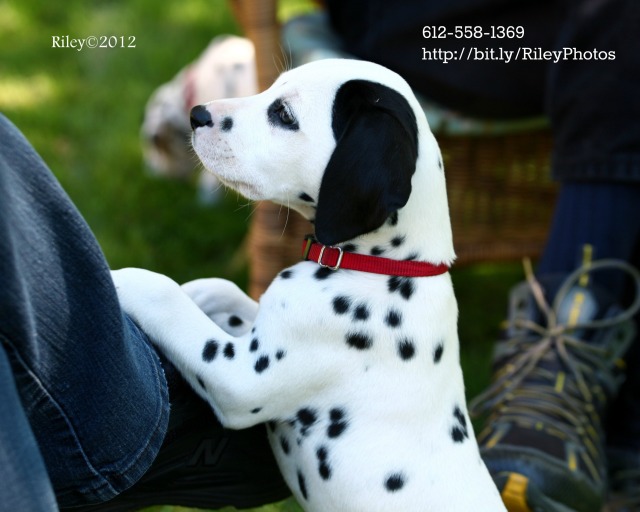
Dalmatian puppy with a patch
Finding A responsible breeder is an important part of selecting your new furry family member.
- To find a responsible dog breeder, start by going to a dog show or visit the American Kennel Club or United Kennel Club web sites to learn more about the breeds and breeders.
- After doing your homework, find a fancier that is knowledgeable
about their breed, and be certain you are comfortable with the people
too. The biggest key to having success in selecting a puppy or dog is to
be selective.
- Visit the breeder’s home or kennel and ask to see at least one of
the puppy’s parents. Seeing the parents of a purebred dog will give you
an idea of what to expect in terms of temperament and appearance.
- While you are visiting the breeder, pay attention to the property.
Is the house/kennel clean? Odor-free? Are the adult dogs and puppies
clean, well fed, lively and friendly? If you see runny noses and eyes,
coughing, open sores, you should probably look at a different location
for your new companion.
- Do the dogs like the breeder and does the breeder like the dogs? The
dogs and pups should be comfortable with people and outgoing with
visitors. If not, it might be in your best interest to move on.
- Learn all you can about the health of potential pup and pup’s
family. Learn from research and the breeder about the breed’s overall
strengths and weaknesses and have a good working knowledge about the
genetic diseases that impact the breed. Ideally, the breeder should know
what steps are being taken to prevent the genetic issues too. Your
breeder should have copies of health screening information to show you
so you know they have been taken care of. Some examples would be OFA and CERF
results. If your breeder only answers direct, specific questions with
regard to their dogs, they may not be lying to you, but they may not be
providing you with the complete truth either.
- Make sure you are comfortable with the breeder since you will have a
connection with them throughout your puppy’s life — yes, it’s a lot
like getting married. The breeder should be an excellent mentor and
resource for you should you have questions or a crisis at any point in
your dog’s life. If for some unfortunate reason you are unable to keep
your dog, the breeder should be your first telephone call to help you
rehome or return your dog.
- Don’t be surprised if your breeder asks you to sign a contract
regarding the care of your potential pup. This is meant to protect the
breeder, you and your puppy.
- Don’t expect to bring home the puppy until it is 8 to 12 weeks of
age. Puppies need lots of time to mature and socialize with its mother
and littermates. If you get a puppy too early, it misses out on the
basic life skills learned from living with other dogs and that can
become a really big problem in your household.
- You will likely have lots of questions to ask the breeder, and
hopefully they will have lots of questions to ask you too. Everyone
wants to get the best possible match for pups and families so be honest
about your situation so you end up with the most appropriate puppy.
- When you buy a puppy, be sure you leave with appropriate
documentation of the dog’s pedigree, also known as “papers” from the
registering club. The two—in the United States — that are generally
acceptable depending on the breed are the American Kennel Club (AKC) and
the United Kennel Club (UKC). You’ll need to send in this application
form to register your dog with the AKC. Be very wary of a breeder who
refuses/hesitates to give you papers, wants to charge you more for AKC /
UKC papers, offers papers from a registry other than the AKC / UKC, or
tells you they will mail them to you at a later date.
- Do your research and know what questions to ask when selecting your new puppy.
Thanks for stopping past. Be sure to visit our web site Dogfooddirect.com and “Like” us on Facebook for exclusive offers and contests.